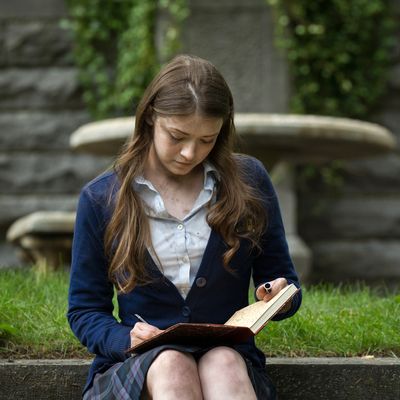
Mary Harron is nothing if not brave. The Moth Diaries seems like it would easily lend itself to all sorts of Twilight-y garishness or horror movie jolts: ItÔÇÖs a tale about a girlsÔÇÖ boarding school where the strange newcomer may just be a vampire. But in HarronÔÇÖs hands the film becomes a tale of suggested horror and creeping identity, where coming of age is almost as scary as supernatural creatures that go bump in the night. ItÔÇÖs icy and exacting and makes your skin crawl, and youÔÇÖre never quite sure why.
Thanks in part to the original template of Dracula, most vampire stories are tales of obsession, and this one is no different, only the obsessives this time are mainly mortals. Rebecca (Sarah Bolger) is a depressed teen whose sole lifeline seems to be her best friend and fellow student Lucie (Sarah Gadon). When an eerie looking new girl, Ernessa (Lily Cole), moves into the dorm, Lucie starts to develop a seemingly unhealthy, Renfield-like fixation on her. In turn, so does Rebecca, who both fears for Lucie and fears for what may happen to herself in LucieÔÇÖs absence. Ernessa also seems to have a strange interest in Rebecca, whose writer father committed suicide and whose memories of him and his death start to become more and more intrusive.
ItÔÇÖs a chain-link of attractions and obsessions, and it could all collapse like a house of cards with one wrong, self-indulgent move. Harron treads a fine line here: Yes, there are hints at lesbianism; yes, there are some dream sequences, even a blood-drenched one; yes, Ernessa seems to walk gracefully on roof ledges; yes, thereÔÇÖs a sex scene; yes, thereÔÇÖs a body count. But this is a director who understands the importance of control and of holding certain things back. In fact, sheÔÇÖs made a career of it, in carefully designed films like The Notorious Bettie Page and I Shot Andy Warhol. (The sole exception is American Psycho, where she let things spin out of control and the subtext became the text in a comical way.)
The Moth Diaries has a stately grace that serves as an ironic counterpoint to the roiling passions within the characters. (ItÔÇÖs hard not to be reminded at times of Peter WeirÔÇÖs seminal Picnic at Hanging Rock.) Not a hair is out of place here, and Declan QuinnÔÇÖs camera captures everything with a creepy perfection. The actors, too, seem virtually designed for their parts ÔÇö most notably Cole, of course, whose wide-set eyes, toweringly willowy frame, and cool demeanor ensure that Ernessa is as transfixing to us as she is to the other characters. Those looking to jump out of their seats or get swept away in supernatural passions may have a hard time with it, but thereÔÇÖs a ruthless precision to this film thatÔÇÖs breathtaking in its own right.


